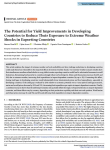Pieralli S., Arsov S., Elleby C., Pérez Domínguez I., Farkas B1. (2025). The potential for yield improvements in developing countries to reduce their exposure to extreme weather shocks in exporting countries. Journal of agricultural economics, 01/06/2025, vol. 76, n. 2, p. 268-281.
https://doi.org/10.1111/1477-9552.12634
https://doi.org/10.1111/1477-9552.12634
| Titre : | The potential for yield improvements in developing countries to reduce their exposure to extreme weather shocks in exporting countries (2025) |
| Auteurs : | S. Pieralli ; S. Arsov ; C. Elleby ; I. Pérez Domínguez ; B1 Farkas |
| Type de document : | Article |
| Dans : | Journal of agricultural economics (vol. 76, n. 2, June 2025) |
| Article en page(s) : | p. 268-281 |
| Langues : | Anglais |
| Langues du résumé : | Anglais |
| Catégories : |
Catégories principales 06 - AGRICULTURE. FORÊTS. PÊCHES ; 6.4 - Production Agricole. Système de ProductionThésaurus IAMM PRODUCTION AGRICOLE ; RENDEMENT DES CULTURES ; EVENEMENTS METEOROLOGIQUES EXTREMES ; EXPORTATION ; PRIX A L'EXPORTATION ; COMMERCE AGRICOLE ; VULNERABILITE |
| Résumé : | This article explores the impact of extreme weather on food availability and how yield gap reductions in developing countries could make them less vulnerable to the imported effects of extreme weather shocks. Our extreme weather scenario results show that simultaneous weather-related shocks to crop yields in main exporting countries could lead to substantial increases in world food prices, threatening food security in countries strongly reliant on food imports. Maize and wheat prices increase by 40% and 50% due to extreme weather, increasing food expenditure in import-dependent countries (by up to 5%). Countering this effect, closing yield gaps in developing countries would substantially lower international prices and food expenditures, especially in developing countries. If the yield gap is reduced by 20% relative to economic potential over a 6-year period (yield gap scenario), maize and world prices decrease by 20% and 15%, decreasing food expenditure per capita in import-dependent countries. Finally, a combined scenario shows that the yield improvements only partially offset the impact of imported shocks on import-dependent countries, and these effects vary by country, depending on their production capability and their net-trade position. World maize and wheat prices increase by only 9% and 26% and still raise food expenditure in import-dependent countries. |
| Cote : | En ligne |
| URL / DOI : | https://doi.org/10.1111/1477-9552.12634 |







